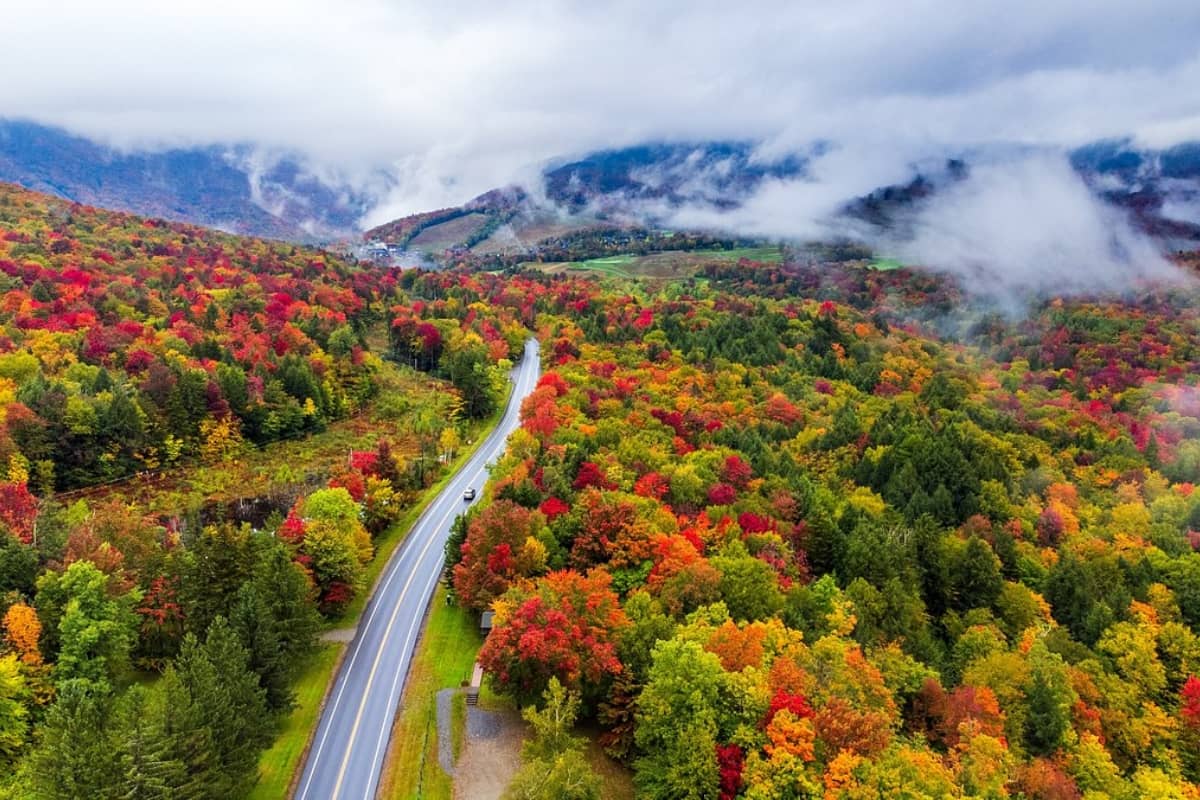Vermont, renowned for its breathtaking fall foliage, attracts thousands of tourists each year, eager to witness the vibrant transformation of the Green Mountains and rural landscapes. However, the influx of visitors during this season also draws the attention of scammers looking to exploit unsuspecting tourists. From fake rentals to fraudulent parking attendants, Vermont’s picturesque towns are not immune to criminal schemes that prey on the enthusiasm of visitors. Being aware of these scams is the first step toward enjoying a safe and memorable trip.
1. Fake Vacation Rentals
One of the most prevalent scams during the fall season in Vermont involves fake vacation rental listings. With platforms like Airbnb and Vrbo popularizing vacation rentals, scammers take advantage of tourists seeking picturesque cabins and homes. These fraudulent listings typically display beautiful properties at discounted prices, often using stolen images from legitimate rental websites. Tourists are lured by these offers and are asked to make upfront payments, typically through untraceable methods such as wire transfers, Zelle, or gift cards.
Upon arrival, visitors are met with disappointment when they discover that the rental does not exist or is already occupied. This type of scam can ruin vacation plans and result in significant financial loss. Booking accommodations through reputable websites like Airbnb or Vrbo is crucial, and payments should always be made through their official channels. Furthermore, tourists should scrutinize reviews and ensure the legitimacy of listings by contacting hosts directly through the platform’s messaging system.
Tip: If a deal seems too good to be true, it probably is. Be cautious of properties that offer significantly lower rates compared to other listings in the same area.
2. Fake Parking Attendants
Fall tourists in Vermont often flock to scenic byways, hiking trails, and small towns to soak in the autumnal beauty. In high-traffic areas, scammers pose as parking attendants, preying on visitors unfamiliar with local parking rules. These scammers typically wear official-looking vests and post signs to make their operations appear legitimate. They ask for cash payments or demand exorbitant fees for parking in free zones.
After collecting money from unsuspecting tourists, the scammer disappears, leaving victims with parking tickets or even towing fees if they park in unauthorized spaces based on the scammer’s guidance. This scam is particularly common in busy areas where official parking is scarce, and tourists are eager to park quickly to start exploring.
Tip: Research parking areas ahead of time and always look for official signage before paying anyone. If uncertain, it’s better to ask local businesses or verify with law enforcement.
3. Utility Scams
Utility scams are another form of fraud that tourists face, particularly when staying in vacation rentals. Scammers impersonating utility companies, such as Green Mountain Power, call or message renters, claiming that the electricity or water will be cut off unless an immediate payment is made. These fraudsters create a sense of urgency to prevent victims from verifying the legitimacy of the request.
Often, the scammer requests payment through untraceable methods like prepaid cards, gift cards, or cryptocurrency. Utility companies like Green Mountain Power never ask for payment in such forms, and this should raise immediate red flags. If tourists receive such a call while staying in a rental, it is essential to contact the utility company directly through their official customer service line.
Tip: Always verify claims of utility outages by calling the company directly using a number from their official website. Rental property owners should also be informed immediately if such requests are made.
4. Charity and Souvenir Fraud
Vermont’s quaint towns are filled with artisans selling handmade products and local vendors promoting various charities. Unfortunately, some scammers exploit the generosity of tourists by posing as charity workers or selling counterfeit goods under the guise of being locally crafted. Scammers set up booths at farmers’ markets, fairs, or popular tourist stops, where they solicit donations for fake causes or sell low-quality “local” souvenirs at inflated prices.
This scam preys on the goodwill of visitors who wish to support the local community. However, tourists can avoid this by purchasing souvenirs from reputable, well-established shops and thoroughly researching charitable organizations before making any donations.
Tip: If donating to a charity, verify its legitimacy through online reviews or websites like Charity Navigator. For souvenirs, look for stores with verifiable reputations and avoid impulse purchases from roadside booths.
Additional Scams to Be Aware Of
While the aforementioned scams are common in Vermont during the fall, there are other fraudulent activities that tourists should be cautious of:
- Credit Card Skimming: This scam involves criminals installing skimming devices on ATMs in tourist-heavy areas. These devices steal credit card information, which is later used to make fraudulent purchases. To avoid this, it’s best to use ATMs located inside banks or well-lit areas. Regularly check your bank statements during and after your trip to catch unauthorized transactions early.
- Fake Wildlife or Scenic Tours: Vermont’s natural beauty draws tourists for scenic drives and wildlife tours. Scammers may promote fake tours online or through flyers, offering “exclusive” access to off-the-beaten-path locations. Visitors pay upfront, only to find that the tour is either nonexistent or falls short of promises.
- Phishing Scams: Fraudsters set up fake websites that advertise fall foliage tours or scenic experiences. These websites appear legitimate, but once tourists enter personal and payment information, their credit card details are stolen, leading to identity theft or financial loss.
How to Avoid Falling Victim to Scams
Vermont’s fall season is a beautiful time to visit, but a few precautions can make all the difference in protecting your trip from scams. Here are some key steps to follow:
- Use Trusted Platforms: Whether booking accommodations, activities, or tours, always use well-known platforms that offer buyer protection. Avoid deals that require wire transfers or prepaid card payments.
- Verify Information: If you’re approached by someone asking for money—whether for parking, utilities, or donations—always verify their claims. Official parking areas have clear signage, utility companies never ask for gift card payments, and legitimate charities provide detailed information.
- Stay Informed: Research the area and familiarize yourself with local rules regarding parking, utility services, and vendors. Reading travel forums or reviews can provide valuable insight into any potential scams in the region.
- Trust Your Instincts: Scammers rely on urgency and pressure tactics to make tourists act without thinking. If something doesn’t feel right, take a step back and research the situation before handing over any money or personal information.
By staying vigilant and informed, you can enjoy the stunning beauty of Vermont in the fall without worrying about falling victim to these common tourist scams.






